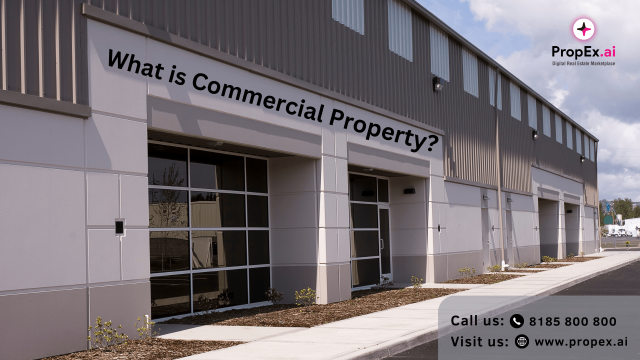When it comes to real estate, the term “what is commercial property” often stirs curiosity. What exactly is commercial property, and how does it differ from residential real estate? If you’re intrigued by the prospects of commercial property investment or if you’ve wondered about commercial residential properties, you’re in the right place.
In this blog, we’ll break down the concept of commercial property, its investment potential, and the distinctions that set it apart from its residential counterpart.
What is Commercial Property?
At its core, commercial property refers to real estate that serves business or income-generating purposes, rather than being used for personal residency. Commercial properties come in various shapes and sizes, designed to accommodate different types of businesses. They include:
| Type of Commercial Property | Description |
| Office Buildings
|
Designed for professional businesses, such as law firms, tech companies, and corporate offices. Can range from single-story structures to towering skyscrapers. |
| Retail Properties
|
Used for selling goods and services to the public. Includes shopping centers, standalone stores, restaurants, and cafes. |
| Industrial Properties
|
Tailored for manufacturing, warehousing, distribution, and industrial activities. Examples include warehouses, factories, and industrial parks. |
| Multifamily Properties
|
Residential buildings with multiple units, primarily for rental income. Includes apartment complexes, condominiums, and other multifamily dwellings. |
| Hospitality Properties
|
Accommodations for travelers and tourists, including hotels, motels, resorts, and related services. |
| Special-Purpose Properties
|
Unique properties serving specific functions, such as hospitals, schools, religious buildings, movie theaters, and sports arenas.
|
Commercial Property Investment: Unlocking Potential
Now that we’ve answered the question “what is commercial property,” let’s delve into the realm of commercial property investment. Commercial property investment involves acquiring commercial real estate with the intent to generate rental income or realize capital appreciation. It’s a compelling choice for investors seeking diversification and potential for higher returns. Here’s a closer look at what makes commercial property investment stand out:
- Potential for Higher Returns: Commercial properties often yield higher rental income compared to residential properties, making them attractive to investors seeking steady cash flow.
- Longer Lease Terms: Commercial leases typically have longer terms, providing stability and a reliable income stream.
- Diversification: Investing in commercial properties allows you to diversify your portfolio, reducing the risk associated with a single property type or location.
- Professional Relationships: Commercial property investment often involves interacting with businesses, potentially leading to valuable professional connections.
- Tax Benefits: There are tax advantages associated with commercial property investment, including depreciation deductions and the ability to defer capital gains through 1031 exchanges.
Understanding Commercial Residential Properties
Now, let’s address the question, “What is a commercial residential property?” A commercial residential property is a multifamily property, such as an apartment complex or condo, that is primarily owned for rental income. While it features residential units, it falls under the commercial category due to its income-generating purpose.
The Importance of Commercial Property Knowledge
Understanding the distinctions between commercial and residential properties is crucial for investors and aspiring real estate professionals. Commercial property investment, in particular, can be a powerful wealth-building tool, but it requires a deeper understanding of the market dynamics and the unique factors that influence success.
For instance, location is often paramount in commercial real estate. A prime location can significantly impact the value and income potential of a commercial property. Moreover, commercial leases are generally more complex than residential leases, and understanding the different types of leases, such as triple-net leases or gross leases, is essential for effective management.
Additionally, the nature of tenants in commercial properties can vary widely. While residential tenants are individuals or families, commercial tenants often consist of businesses with diverse needs and financial profiles. Building strong relationships with commercial tenants, understanding their requirements, and providing excellent property management services are key to maintaining long-term occupancy and income stability.
Also Read: How to convert residential property to commercial property
What is Commercial Property Investment?
Commercial property investment refers to the process of acquiring and owning commercial real estate assets with the primary objective of generating rental income and realizing potential capital appreciation. Unlike residential real estate, where properties are mainly intended for personal occupancy, commercial properties are designed for business purposes and income generation.
Commercial property investment presents several advantages for investors:
- Higher Income Potential: Commercial properties often yield higher rental income compared to residential properties. Businesses typically sign longer leases, providing a stable and potentially higher income stream.
- Portfolio Diversification: Investing in commercial properties allows investors to diversify their portfolios, reducing risk by spreading investments across different property types and locations.
- Longer Lease Terms: Commercial leases typically have longer terms than residential leases, offering more predictability and stability in cash flow.
- Professional Relationships: Commercial property investment involves interactions with businesses, which can lead to valuable professional connections and networking opportunities.
- Tax Benefits: There are various tax advantages associated with commercial property investment, including depreciation deductions and the option to defer capital gains through mechanisms like 1031 exchanges.
Successful commercial property investment requires careful due diligence, including thorough market research, tenant screening, understanding lease terms, and effective property management. It’s a dynamic and potentially rewarding sector within the real estate market.
What is a Commercial Residential Property?
A commercial residential property, often referred to as a multifamily property, blurs the line between commercial and residential real estate. It consists of multiple housing units, such as apartments or condominiums, and is primarily owned for rental income generation rather than personal occupancy.
Key characteristics of commercial residential properties include:
- Income Generation: The primary purpose of owning a commercial residential property is to generate rental income by leasing out individual units to tenants.
- Property Management: Effective property management is crucial to ensure tenant satisfaction, handle maintenance, and maintain profitability.
- Tenant Diversity: Commercial residential properties typically house a diverse group of tenants, each with their own leasing agreements.
- Steady Cash Flow: Rental income from multiple tenants can provide a stable and consistent cash flow, making commercial residential properties attractive to investors seeking regular income.
Investors often choose commercial residential properties for their potential to generate passive income while benefiting from property appreciation over time. However, managing multifamily properties requires attention to tenant relations, property maintenance, and understanding the unique dynamics of the rental market. Commercial residential properties offer an opportunity to diversify a real estate portfolio and tap into the income potential of rental properties.
Conclusion
In summary, “what is commercial property” represents a diverse and potentially rewarding sector within the real estate market. Knowing what commercial property is and how it differs from residential property is essential for investors looking to explore its potential. With the right strategy and knowledge, commercial property investment can be a valuable addition to your portfolio, offering both income and growth opportunities.
Keep in mind that location, tenant quality, lease terms, and income potential are critical factors when evaluating commercial property investments. Make informed choices, and your foray into commercial real estate could become a key driver of financial success. So, whether you’re eyeing an office building, a retail space, or a unique special-purpose property, commercial real estate might just be the avenue to explore for a prosperous investment journey.
Frequently Asked Questions
What is commercial property investment?
What is cap rate on commercial property?
What is residential and commercial property?
What is commercial property management?
What is semi-commercial property?





